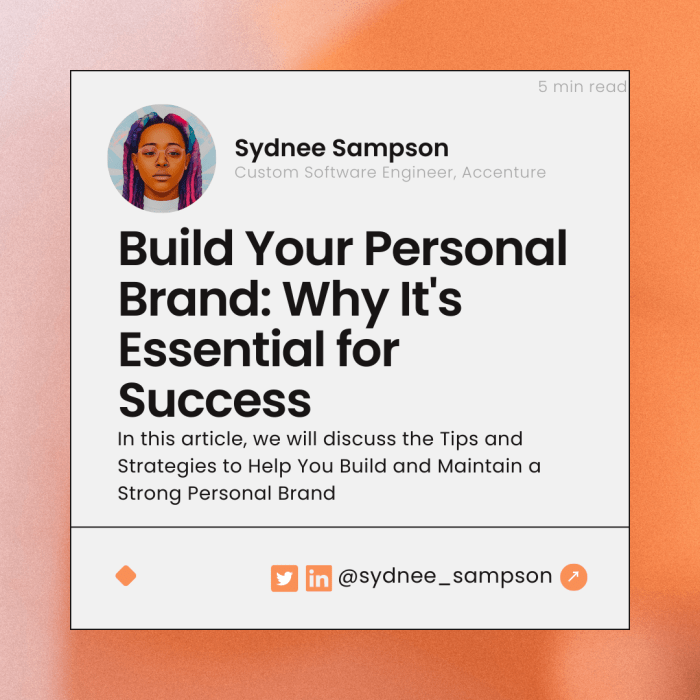Building a personal brand for job success sets the foundation for career growth and opportunities. From defining your unique value proposition to leveraging social media and networking, this topic explores essential elements for establishing a strong personal brand.
As we delve deeper into the strategies and tactics involved in personal branding, readers will gain valuable insights and actionable tips to enhance their professional reputation and stand out in the competitive job market.
Building a Strong Personal Brand

In today’s competitive job market, building a strong personal brand is essential for standing out and advancing your career. Your personal brand is what sets you apart from others and showcases your unique qualities and skills. Here are some tips on defining your unique value proposition and the importance of consistency in personal branding.
Defining Your Unique Value Proposition
When defining your unique value proposition, think about what makes you different from others in your field. Consider your strengths, skills, experiences, and passions that set you apart. Your unique value proposition should clearly communicate what you can offer to employers or clients that others cannot.
Get the entire information you require about Dealing with difficult coworkers at work on this page.
- Identify your strengths and skills that make you unique.
- Highlight your experiences and achievements that showcase your expertise.
- Clearly articulate what sets you apart from others in your industry.
- Create a personal brand statement that summarizes your unique value proposition.
The Importance of Consistency in Personal Branding
Consistency is key when it comes to personal branding. It helps build trust and credibility with your audience, whether it’s potential employers, clients, or industry peers. Consistency in your personal brand message, visuals, and online presence reinforces your brand identity and creates a memorable impression.
- Use the same tone of voice and messaging across all platforms.
- Maintain a cohesive visual identity, including colors, fonts, and imagery.
- Regularly update your online profiles and content to reflect your brand message.
- Engage with your audience consistently to build relationships and strengthen your brand.
Examples of Successful Personal Brands
Successful personal brands can be found in various industries, showcasing how individuals have effectively differentiated themselves and built a strong reputation. Some examples include:
- Elon Musk: Known for his innovative thinking and leadership in the tech and space industries.
- Oprah Winfrey: A media mogul who has built a brand around empowerment and inspiration.
- Gary Vaynerchuk: A digital marketing expert who has established a personal brand focused on hustle and authenticity.
- Brene Brown: A renowned author and speaker who has created a personal brand around vulnerability and courage.
Utilizing Social Media for Personal Branding

In today’s digital age, social media has become a powerful tool for building and promoting your personal brand. It allows you to showcase your skills, expertise, and personality to a wide audience. Here are some strategies on how to effectively utilize social media for personal branding.
Choosing the Right Social Media Platforms
When it comes to personal branding, it’s essential to choose the right social media platforms that align with your brand and target audience. Consider the following factors:
- Identify your target audience: Understand who your target audience is and which social media platforms they are most active on.
- Choose platforms that suit your content: Different platforms cater to different types of content. For example, visual content performs well on Instagram and Pinterest, while professional content is more suited for LinkedIn.
- Research competitors: Look at what platforms your competitors are using successfully and consider leveraging those platforms as well.
- Consistency is key: It’s better to focus on a few platforms and consistently engage with your audience rather than spreading yourself too thin across multiple platforms.
Creating Engaging Content on Social Media
Engaging content is crucial for personal branding as it helps you connect with your audience and build relationships. Here are some strategies to create compelling content:
- Share valuable insights: Provide valuable information, tips, and advice related to your expertise to position yourself as an authority in your field.
- Showcase your personality: Don’t be afraid to show your authentic self on social media. Share personal stories, behind-the-scenes glimpses, and moments that highlight your personality.
- Use visuals: Visual content such as images, videos, and infographics tend to perform better on social media. Make sure to include eye-catching visuals in your posts.
- Engage with your audience: Respond to comments, messages, and mentions to foster meaningful interactions with your followers.
Leveraging Social Media Analytics
Utilizing social media analytics can provide valuable insights into your brand performance and help you make informed decisions. Here’s how you can leverage social media analytics:
- Track key metrics: Monitor metrics such as reach, engagement, follower growth, and click-through rates to gauge the effectiveness of your content.
- Identify trends: Analyze trends in your content performance to understand what resonates with your audience and adjust your strategy accordingly.
- Competitor analysis: Keep an eye on your competitors’ social media performance to benchmark your brand against them and identify areas for improvement.
- Optimize your strategy: Use analytics data to optimize your content strategy, posting schedule, and engagement tactics for better results.
Networking and Collaborations for Personal Brand Growth: Building A Personal Brand For Job Success

Building a strong personal brand goes beyond just showcasing your skills and expertise. Networking and collaborations play a crucial role in enhancing your brand presence and opening up new opportunities in your industry.
Building Relationships with Industry Influencers, Building a personal brand for job success
Connecting with industry influencers can help elevate your personal brand by associating yourself with respected figures in your field. Here are some tips on how to build relationships with influencers:
- Engage with their content on social media by liking, commenting, and sharing.
- Attend industry events where influencers are present and make an effort to introduce yourself.
- Offer value by sharing your own expertise and insights that can benefit them.
- Be genuine and authentic in your interactions to build trust and credibility.
Collaborating with Other Professionals
Collaborating with other professionals can help you reach a wider audience and showcase different facets of your skills. Here are some tips on how to collaborate effectively:
- Identify professionals in complementary fields who can bring new perspectives to your work.
- Work on joint projects or initiatives that highlight both your strengths and create mutual benefits.
- Promote each other’s work on social media and other platforms to leverage each other’s networks.
- Communicate openly and establish clear goals and expectations for the collaboration.
Benefits of Networking Events
Networking events provide valuable opportunities to connect with industry peers, potential clients, and collaborators. Here are some ways to make the most of networking events:
- Come prepared with a clear elevator pitch that highlights your unique selling points.
- Listen actively and show genuine interest in others to build meaningful connections.
- Follow up with new contacts after the event to nurture relationships and explore potential collaborations.
- Attend a variety of events, both online and offline, to diversify your network and expand your opportunities.